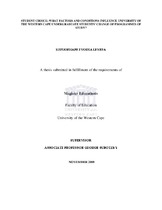Student choice : what factors and conditions influence University of the Western Cape undergraduate students' change of programmes of study
Abstract
The main aim of the study was to investigate change of programmes of study at University of the Western Cape (UWC). This involved examining the extent, nature and possible range of factors which shape change of programmes. The factors influencing choice to study at UWC and choice of programmes formed the background for understanding the link between choice and change of programmes. The study focused on first-time entering undergraduates in selected faculties: Arts, Economics and Management Sciences (EMS) and Community and Health Sciences (CHS). The progression “pathways†of these students were tracked from first year of enrolment in 2001 to 2004. The findings of the longitudinal data showed that the percentage of students who changed their programmes in the Faculty of Arts and in CHS was very minimal. In total 5% changed their programmes in CHS in three-year programmes while in four-year programmes only 2% changed their programmes. In the Faculty of Arts in three-year and four-year programmes change of programmes ranged from 6% to 10%. The significant change of programmes of study happened in EMS which also had the highest enrolments. In total 18% of the students changed their programmes. It appeared from the statistical data that failure and academic exclusion could be associated with change of programmes of study. Other factors such as financial problems, poor grouping of courses, exploring and changing to preferred programmes as well came out from the interviews as major influences of change of programmes.

